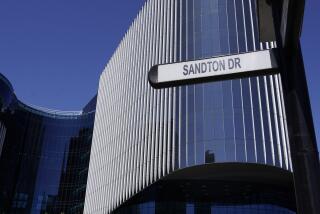20,000 at Apartheid Foe’s Funeral
- Share via
PORT ELIZABETH, South Africa — About 20,000 blacks poured into the tree-lined streets of Port Elizabeth for the funeral today of white anti-apartheid activist Molly Blackburn, who was revered as a “warrior of justice.”
It was the largest black turnout ever at a white funeral. About 2,000 blacks marched in Johannesburg in 1981 at the funeral of physician and union organizer Neil Agget, who died by hanging while in police detention.
Today, middle-class whites wept and blacks proudly saluted the 55-year-old, silver-haired woman, who was a constant opponent of white domination in South Africa. No violence was reported in this port city, 600 miles south of Johannesburg.
Killed in Collision
Blackburn and white civil rights lawyer Brian Bishop died Saturday when their car collided head-on with another vehicle as they returned to Port Elizabeth from interviewing blacks arrested by security police. The driver of the other car was also killed.
Blackburn had received regular death threats, but her husband, Gavin, said foul play was not suspected.
“There are precious few white people in this country who have been able to do what Molly Blackburn has done,” said the Rev. Allan Boesak, president of the World Alliance of Reformed Churches and a leading opponent of apartheid.
“Molly continues in death what she did all her life,” added Boesak, a mixed-race minister whose passport has been confiscated by the white-led government. “She brings us together and anticipates what this country can and should be. She was a true daughter of Africa.”
Busloads of chanting blacks began arriving at the stone, 19th-Century St. John’s Methodist Church two hours after dawn for the mid-morning ceremony.
Mourners Dance
As the crowd swelled, black mourners broke into a “toi toi,” a wild dance, and there was mock fighting and harsh slogans against whites.
White women shaded by straw sun hats and their husbands, wearing ties and crisp summery suits, moved uneasily among the blacks who filled the streets outside the church. The blacks shouted in Xhosa language of the mother of seven: “She is a soldier. Molly died on our side.”
“You could say we are getting a look at their way of doing things,” said Adrian Bourne, a white who lives nearby. “I’ve never seen anything like this before.”
More than a political activist, Blackburn was seen by blacks as their personal champion.
“If there was a report that police started shooting, Molly checked it out,” black community leader Edgar Ngoyi told the packed, multiracial congregation. “If she heard somebody was tortured, Molly asked the right people the right questions. If you needed help, you called Molly.”
A familiar figure at funerals for blacks killed in clashes with police through 16 months of anti-apartheid rioting, Blackburn would regularly venture into potentially dangerous black areas to investigate reports of police abuse.
‘Don’t Like Bullies’
“I don’t like bullies,” she said, explaining her philosophy in an interview last July.
More to Read
Sign up for Essential California
The most important California stories and recommendations in your inbox every morning.
You may occasionally receive promotional content from the Los Angeles Times.













